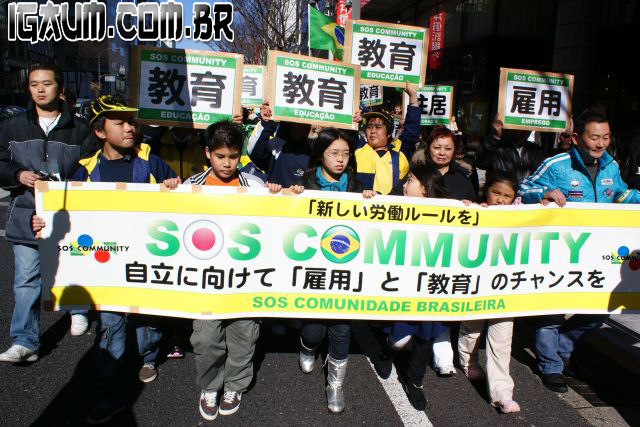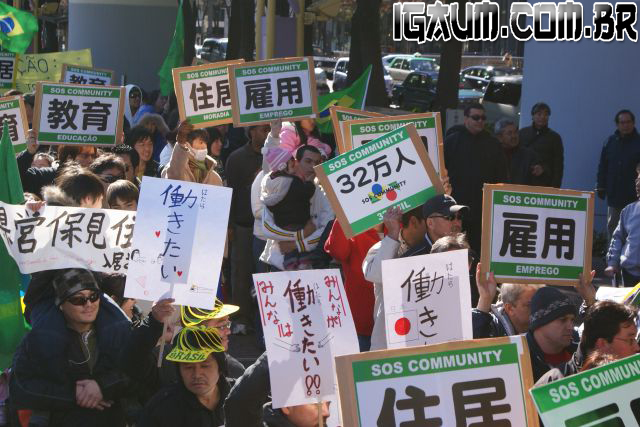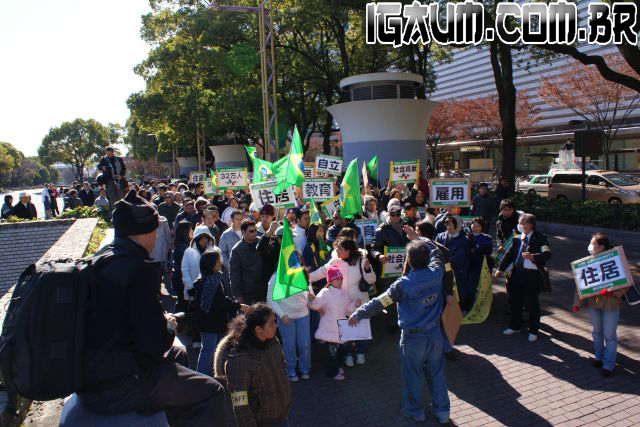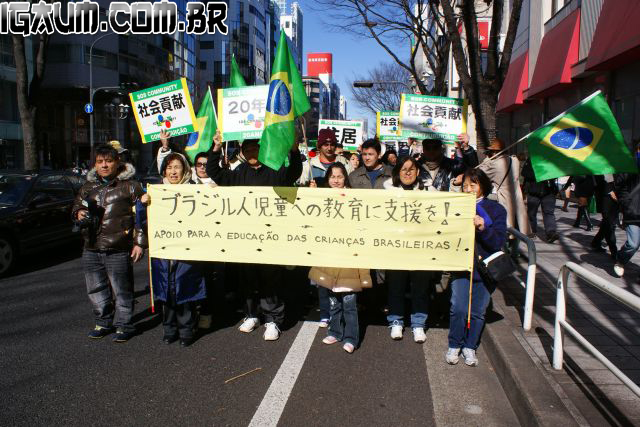It is estimated that between 40,000 and 50,000 Brazilian immigrants in Japan have made or are planning to make the journey back across the sea. Most of these workers are young Brazilains of Japanese descent who moved to Japan in search of a better life. The majority of them used to be able to find temporary employment working in the auto and electronics factories, which have been deeply affected by the crisis – the worst since the World War II.
According to the Bank of Brazil in Japan, there have been 25,000 change of address requests from Japan to Brazil since October 2008. This shows an inversion of the trend that had started around 30 years ago, when Japan experienced an economic boom and the Brazilian economy, on the other hand, was in recession. As the Japanese economy has been shrinking at its fastest pace in about 35 years, Bah [pt] says, 2008 “was the year that Brazil became the new Japan for many Brazilians”.
Igaum [pt] blog, whose pictures of a protest in Nagoya demanding better working rights, jobs and more support from the Japanese government for foreign workers illustrate this piece, witnesses the end of the dream of getting a better life for a whole generation:
Muitos dos trabalhadores demitidos conquistaram bens aqui, pois não planejavam voltar tão cedo, porém, com a atual situação muitos estão deixando tudo para trás e voltando para a terra natal, o que se vê é a frustração de muitos que vieram em busca de um sonho que obrigatóriamente foi interrompido, não só os que estão desempregados até mesmo os que ainda estão trabalhando já estão de malas prontas para voltar, para não saírem mais frustrados do Japão.
According to the organizers, there were 1,500 people protesting in Nagoya on February the 1st. Photo by Igaum, used with permission.
This is exactly what happened to Bah [pt]. After 4 years living in Japan and visiting Brazil for holidays, she and her husband arrived for good in São Paulo this March the 8th, sharing an airplane packed full of Brazilians, all of them laid off recently. Unlike her fellow travellers, they were both still employed but decided to resign because the crisis affected their working conditions: they would have had to accept to work less hours and earn less, with no paid holidays [pt] if they wanted to keep their jobs in a factory. She says she has learnt a lot about life living in Japan, but feels good about going back home:
Se eu estou feliz? Muito.
Nao sei o que vai ser daqui pra frente, temos mil coisas pra resolver agora, mas de uma coisa eu tenho certeza: quando resolvi escutar meu coracao pra saber o que seria melhor fazer, eu escolhi o caminho certo.
I don't know what will happen from now on, we have a thousand of issues to sort out right now, but I am sure of one thing: when I decided to listen to my heart to know what was the best thing to do, I chose the right path.
30-year-old Elaine [pt], living in Japan for 14 years, lost her job at the end of February but still hopes to be able to find another one and stay in Japan. On March the 9th, in a post called “Surviving”, she says that there are no signs that the economy is getting any better. She feels lucky to still have a home and food, as she is living with her still employed friends:
A crise não dá sinais de melhora e com isso existem mtos brasileiros que aqui residiam e que já regressaram ao Brasil,os que ficaram,como eu,estamos tentando sobreviver nessa crise brava que afetou o Japão,quase todos os dias eu vejo nas notícias do Japão alguns brasileiros que vivem nas ruas, que não tem nem o que comer e outros que vivem em abrigos públicos,contando com os donativos de pessoas solidárias.
Renata Shimura [pt] received her notice in December, worked until mid-January and has started the job hunt. She shares her experience in the Employment Service Center for Foreigners, known as Hello Work, to apply for the job seekers allowance. There were around 100 people in the meeting she attended, all of them foreigners, mostly Peruvian and Brazilian. She explains the system:
Existe uma data chamada “Data de Verificação” na qual a pessoa deve comparecer ao Hello Work onde está cadastrado para informar se conseguiu um novo emprego e se está se empenhando na busca do mesmo. Essa data de repete no mínimo uma vez ao mês. Eles enfatizaram que o pagamento do seguro somente é liberado para aqueles que realmente se empenham neste processo. Nesses período de três meses de recebimento do seguro desemprego terei de ir no mínimo mais três vezes na Hello Work e terei de pesquisar/consultar vagas de emprego lá, senão pode ser que não liberem o pagamento do seguro. E essas consultas de vaga de emprego envolvem esperar um tempão pra ser atendido pelo funcionário que faz a consulta no computador, uma vez que os Hello Works do Japão andam lotados de gente devido a crise que passamos aqui. O jeito é rezar para conseguir um novo emprego logo e que também ocorra tudo bem nesse processo do Seguro Desemprego.
Photo by Igaum, used with permission.
Kurati [pt] has been visiting Hello Work offices in different provinces, and has noticed that he didn't see any Brazilians around last time. He wonders if it was because there were no interpreters on that particular day, or if most Brazilians have already given up. He feels there are opportunities, if people look for them – so far he has found some odd jobs. He asks: is it all media sensationalism?
A agência não estava lotada,e fui atendido em 20 minutos.Trabalho em fábrica ainda existe,mas como havia dito antes,não querem nem saber de estrangeiros.Pedi uma verificação em tudo quanto é trabalho que aceita estrangeiros e apareceram 29 vagas para a província inteira, a maioria na área de construção civil e na área de serviços (asilos).Pedi umas fichas e recebi uma listagem de vagas na região ,que estou analisando agora.Se alguma me interessar ,volto lá amanhã e peço uma carta de apresentação.
A mídia japonesa não tem fartura de notícias(diferente do Brasil,onde temos vários homícidios por semana),por isso faz um sensacionalismo danado com a crise.Ficam mostrando um monte de japoneses morando nas ruas,perdendo emprego,chorando ,enquanto isso na agência pública de empregos,existem centenas de vagas sobrando.São vagas que estão ali faz tempo,mas ao que parece os japoneses não estão muito afim de trabalhar,e ainda esnobam,enquanto os estrangeiros imploram por uma chance.A tv mostra uma coisa e o mundo real mostra outra.This sucks!!!!!
The Japanese media hasn't got many news worthy issues (unlike Brazil, where we have so many murders per week), so they make a darn sensationalism of the crisis. They keep showing a lot of Japanese people living on the streets, losing jobs, crying, while the public recruiting agency has hundreds of places available. These are vacancies that have been there for a long time, but it seems the Japanese people are not so much into working [in these jobs] and are also snobbish, while foreigners are begging for a chance. The TV shows something and the real world shows another. This sucks!!!!!
Igaum [pt] shares on his blog one of these stories that have been on the news. It is about a 36 year old Brazilian who lost his job 6 months ago and with no money to pay his rent, has been living on the streets of Hamamatsu, in the Shizuoka province. Yet, he would not go back home:
O inicio da reportagem mostra como como Pereira passa seus dias, revirando o lixo em busca de latas, sucatas e materiais que podem ser vendido nos centros de reciclagem, o brasileiro vai com sua bicicleta cheia de lixo até um desses centros de reciclagem vender o material recolhido e consegue 350 ienes (aproximadamente 3 dólares). Em vez de usar para comer, ele vai guardando o dinheiro até juntar o mínimo para poder enviar para sua esposa e seus filhos no Brasil.
Vendo a dura situação de Pereira e o esforço dele para sobreviver, um japonês cedeu um apartamento para ele morar e eventualmente recebe doações de comida, uma ONG as vezes o ajuda também doando alguns alimentos, mas, na falta dessas doações ele sobrevive com o que acha no lixo para se alimentar, Pereira se diz muito agradecido pela ajuda e afirma amar o Japão.
A reportagem termina com Pereira ligando para a família no dia 1º de Janeiro, sua esposa indaga o porque ele não volta ao Brasil, Pereira se diz determinado em continuar sua vida aqui no Japão, pois acha que no Brasil não terá nenhuma oportunidade de emprego, e equanto a situação não melhora ele acha mais viável continuar cantando sucatas e guardando o dinheiro para enviar ao Brasil.
The report finishes with Pereira calling his family on January the 1st, his wife asks why he doesn't come back to Brazil, Pereira says he is determined to carry on his life in Japan because he thinks that in Brazil he will have no job opportunities, and while the situation isn't improving he thinks it more feasible to look for scrap and save money to send it to Brazil.
Photo by Igaum, used with permission.
Job vacancies at the recruiting agency plummeted nearly 60 percent in February from a year earlier and it has been increasingly difficult even for Japanese people to find employment opportunities. Brazilians, most of them previously working in factories that employed a good deal of foreigners, are not able to compete in the remaining job market when the language barrier is an issue, now they dispute vacancies with locals. No Japão [In Japan, pt] blog says that most Brazilians don't even learn the basic spoken language, and thus are not able to communicate properly, let alone hunt for jobs in other sectors. He stresses how important learning the language is to be fully integrated in a different society:
Mas uma parte dos brasileiros infelizmente não pensa da mesma maneira, já ouvi opiniões como “pra que vou aprender japonês se vou voltar ao Brasil?”, é uma triste realidade, a imperícia de se lidar com uma cultura totalmente diferente da nossa, pode levar à mal-entendidos que prejudicam a imagem da comunidade brasileira como um todo, o gesto de alguns torna-se o gesto de todos aos olhos dos japoneses, por isso a adaptação à lingua e à cultura, hoje são coisas que podem fazer a diferença entre estar empregado ou não.
Fica difícil de se encontrar um emprego se não consegue compreender o que o empregador está falando, a imagem fica totalmente prejudicada, e do lado do empregador, como confiar em uma pessoa que não entende o que ele fala? essa pessoa vai conseguir realizar o trabalho que lhe for designado? São perguntas que me ocorrem quando penso sobre o assunto.
Aqui onde moro tenho visto várias reportagens na TV sobre os brasileiros começando a aprender japonês, numa tentativa de encontrar uma colocação no mercado de trabalho, um gesto louvável, mas os frutos desse esforço demoram um pouco para aparecer, e nem todos tem esse tempo para esperar.
It is difficult to find a job if you can not understand what your employer is saying, your image is totally damaged, and putting yourself in the employers’ shoes, how can they trust a person who does not understand what they say? Will that person manage to do the work he/she was assigned? These are questions that occur to me when I think about it.
Here, where I live, I have seen several news items on TV about Brazilians who have started to learn Japanese in an attempt to find a placement in the labour market, a commendable gesture, but the fruits of this effort do take a while to appear, and not everyone has the time to wait for them.
To help those who have decided to stay or those who are stuck in Japan because they cannot afford the air plane ticket to Brazil, a brand new blog is at hand: Superando a Crise [Overcoming the Crisis, pt] started this March. Silvio Y. Nakano, who lives in Aichi with his family, explains he decided to start the blog because he felt broken-hearted at seeing so many families breaking up because of the crisis, and this is his way to help those who are trying to stay in Japan. The blog aims to gather information about the crisis and provide tips on how to overcome it, posting jobs open to Brazilians and tips on how to save money. The blogger has a very optimistic view:
I am truly confidant that this crisis will pass, not all of a sudden of course, but little by little and those who are prepared when the economy is normal again, will be the big winners.
So let's take this opportunity to learn, undergo courses, devote a little bit more time to our careers, whenever possible, I will be posting information about it, and I hope you will comment and leave your opinions, which will be very valuable to me, you can be sure
So let's take this opportunity to learn, undergo courses, devote a little bit more to our careers, whenever possible, I will be posting information about it, and I hope you will comment and leave your opinion, which will be very valuable to me, you can be sure.
Photo by Igaum, used with permission.
There are approximately 275,000 Brazilian Dekasegis in Japan and some of the biggest communities are concentrated in Shizuoka, Aichi, Hamamatsu and Mie. The ties between the two countries began 100 years ago, when the first Japanese families arrived in Brazil.











4 comments
Como eu queria ir para o japao nem que seja pra catar latas e sobreviver, la é muito bem organizado nao existe bandidos ,as ruas sao limpas , e outra coisa eu posso tirar fotos com minha camera ou andar com meu notebook e tenho certeza que nao seria roubado como é aqui no Brazil ,pouca vergonha isso =(
i like japan